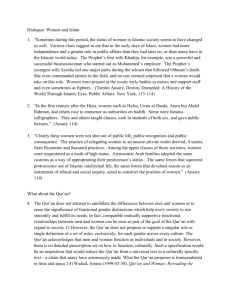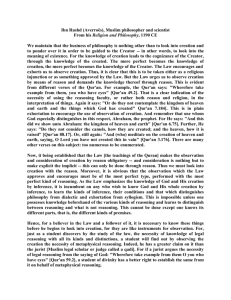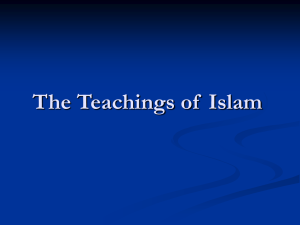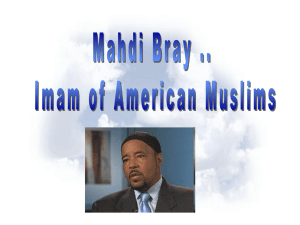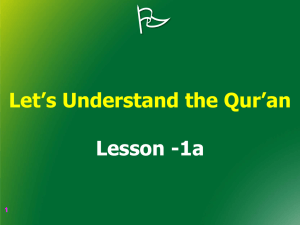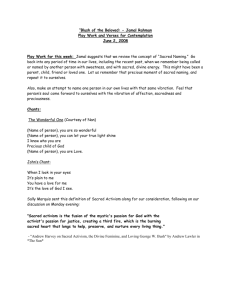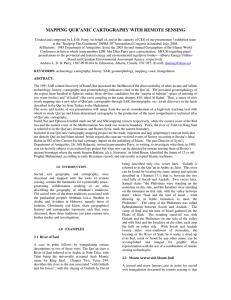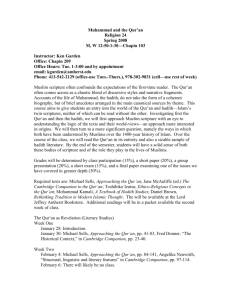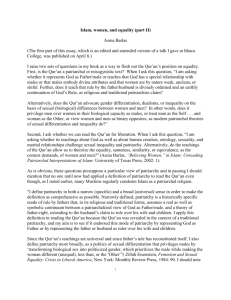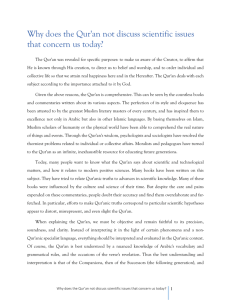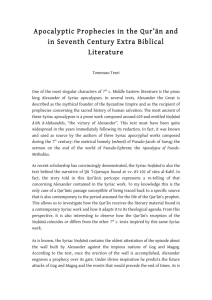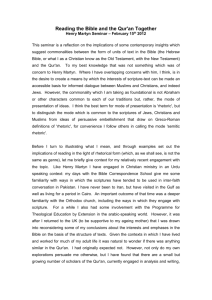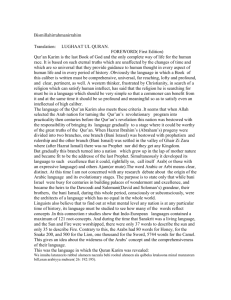"Contemporary Critical Practices and the Qur`an"
advertisement
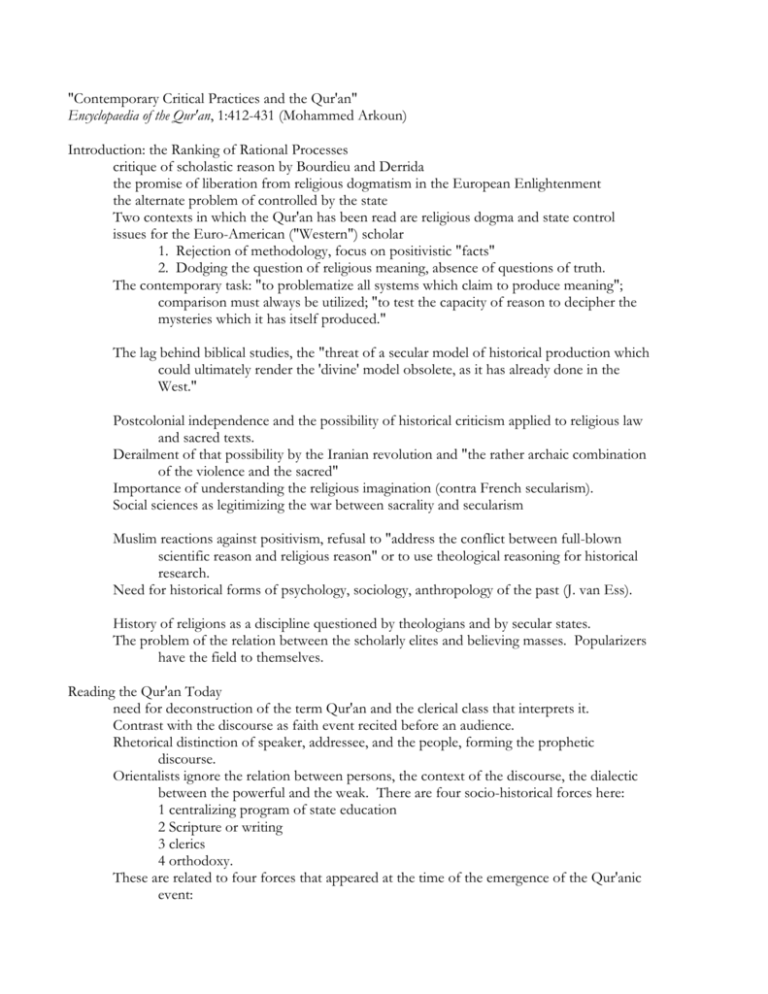
"Contemporary Critical Practices and the Qur'an" Encyclopaedia of the Qur'an, 1:412-431 (Mohammed Arkoun) Introduction: the Ranking of Rational Processes critique of scholastic reason by Bourdieu and Derrida the promise of liberation from religious dogmatism in the European Enlightenment the alternate problem of controlled by the state Two contexts in which the Qur'an has been read are religious dogma and state control issues for the Euro-American ("Western") scholar 1. Rejection of methodology, focus on positivistic "facts" 2. Dodging the question of religious meaning, absence of questions of truth. The contemporary task: "to problematize all systems which claim to produce meaning"; comparison must always be utilized; "to test the capacity of reason to decipher the mysteries which it has itself produced." The lag behind biblical studies, the "threat of a secular model of historical production which could ultimately render the 'divine' model obsolete, as it has already done in the West." Postcolonial independence and the possibility of historical criticism applied to religious law and sacred texts. Derailment of that possibility by the Iranian revolution and "the rather archaic combination of the violence and the sacred" Importance of understanding the religious imagination (contra French secularism). Social sciences as legitimizing the war between sacrality and secularism Muslim reactions against positivism, refusal to "address the conflict between full-blown scientific reason and religious reason" or to use theological reasoning for historical research. Need for historical forms of psychology, sociology, anthropology of the past (J. van Ess). History of religions as a discipline questioned by theologians and by secular states. The problem of the relation between the scholarly elites and believing masses. Popularizers have the field to themselves. Reading the Qur'an Today need for deconstruction of the term Qur'an and the clerical class that interprets it. Contrast with the discourse as faith event recited before an audience. Rhetorical distinction of speaker, addressee, and the people, forming the prophetic discourse. Orientalists ignore the relation between persons, the context of the discourse, the dialectic between the powerful and the weak. There are four socio-historical forces here: 1 centralizing program of state education 2 Scripture or writing 3 clerics 4 orthodoxy. These are related to four forces that appeared at the time of the emergence of the Qur'anic event: 1 a segmented society which defies uniformity 2 orality 3 culture which is called popular/populist 4 heterodoxies important achievement of orientalist scholarship, despite small numbers. Two additional questions: 1 an unreflective atheism applied to comparative history and religious studies 2 self-censorship against expression of religious conclusions "The deconstruction of every form of orthodoxy falsely rendered sacred by historical figures who happened to succeed politically is one of the most critical tasks for the social sciences." Examples of orientalist scholars calling certain schools heretical how to distinguish the Qur'an from other important scriptural traditions? "The invocation of the religious dimension... ought not lead to any concession to dogmatic definitions" requirements for new scholarly investigation of the Qur'anic event: 1 more Muslim researchers need to participate in the exchange of thoughts 2 previous and contemporary Muslim scholars need to be included -- but who? Priorities and Limits of Historical-Anthropological Interpretation the problem of prioritizing Orientalists and alienating Muslim faithful. "The Qur'an as an object of research is a collection of initially oral utterances put into writing in historical conditions not yet elucidated. These entrances were then elevated, by the industry of generations of historical figures, to the status of the sacred book which preserves the transcendent word of God and serves as ultimate inevitable point of reference for every act, every form of behavior and every thought of the faithful" the problem: "to appeal not only to the community of reflective researchers but also to those believers who consider themselves practicing and orthodox Muslims" Arkoun’s research: comparison between Suyuti, Alford Welch, and the social sciences. The early confluence of positivist reasoning and colonial rule. The search for a critical text of the Qur'an. The highly technical character of recent research on the Qur'an, despite its character as a text about the nature of truth. Example of the recent work of J. Chabbi as taking account of the relationship between the historian and the believer. Anthropological categories (myth, social imagination) can restore social context and rescue utterances from subsequent religious readings. This also steps outside of reduction of the Qur'an to biblical readings. Interpretation of all sacred sources, which are no longer viewed as facts. Commentators treated no longer as authorities but as changing context of interpretation. Further comment on Chabbi: can a historian do justice to the following -1 the Meccan Qur'an restored to its "concrete historical and linguistic reality as distinct from the Medinan corpus" 2 the "Close Official Corpus." The leader community only pays attention to the second. But both original recitation and later canonization must be subjected to the same examination. Concept of "societies of the book-Book" to re-engage with revelation before it was discarded by the Enlightenment. Linguistic, Semiotic and Literary Interpretation lack of semiotic study of the Qur'an a sign of intellectual timidity (in contrast to similar study of the Bible) example of Northrop Frye, The Great Code, for the study of the Bible positive results of literary study of metaphor retention of the oral status of Scripture through liturgy and ritual literary reflections on the Qur'an by Ibn al-`Arabi (d. 1240), Nasr Abu Zayd (contemporary) The Religious Interpretation multiple possibilities of interpretation by a community restriction of scholarly analysis to the Closed Official Corpus: dogmatic enclosure plus commentaries treated as authorities of orthodoxy. Orientalism also imprisoned within the dogmatic enclosure, first with Sunni and then with Shi`i Islam. The need for tracing a genealogy of the articles of faith rather than taking them on face value. Possibility of exploring "the shared Islamic imagination" of major interpreters the ironic fact that "Qur'anic studies has depended upon the Orientalist scholarship of the 19th century" along with the limitations (self-imposed) of Muslim scholarship (example of Shahrur). Final Proposals importance of the Encyclopedia of the Qur'an, an overdue project. This needs to be complemented by: -- a comparative approach with historical anthropology of the Mediterranean/near East, "to deepen our knowledge of constituent elements common to the monotheistic religious conscience in its global historical genesis and manner of differentiation." -- The concept of Closed Official Corpus" as a way to problematize orthodoxy ( compare apocryphal Christian writings), and to point to scholarly research without the burden of dogma -- comparative historical approach to "the theological and philosophical attitudes of reason" -- "a protocol of interpretation that is free both from the dogmatic Orthodox framework and procedural disciplines of modern scientism"
